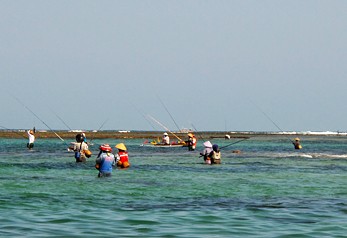
The islands of Southeast Asia and Melanesia are home to over 360 million people, one-third of whom are directly dependent on coastal and marine resources for their livelihoods and food security. In an area known as the Coral Triangle, citizens of Indonesia, Malaysia, Papua New Guinea, the Philippines, the Solomon Islands, and Timor-Leste live at the global epicenter of marine biodiversity, near waters that are home to over 500 species of reef building corals and 3,000 species of fish. Within the Coral Triangle, fisheries are a principal source of food and livelihood, providing about 70% of protein intake for coastal populations and up to 90% in poor villages. The region hosts critical spawning and juvenile grow-out areas for five commercial tuna species, producing approximately 40% of the world’s tuna. Unfortunately, these resources are in serious peril. Up to 80% of the coral reefs and fisheries in areas of the Coral Triangle are under risk of collapse.
“Over 100 million of our citizens depend every day on these critical marine resources for their income, their livelihoods, their food security and the protection of their coast. These resources are threatened,” warned Susilo B. Yudhoyono, President of Indonesia, at the World Ocean Conference in May 2009 in Manado, Indonesia. The marine and coastal resources of the Coral Triangle face immediate risks from a range of factors, including over-fishing and unsustainable fishing methods, land-based sources of pollution, and climate change. At the Conference, the heads of government of the six countries of the Coral Triangle, committed to joining forces to use innovative, cutting edge approaches to fisheries and biodiversity conservation with the aim of safeguarding food security, reducing and preventing poverty, and facilitating adaptation to climate change. The launch of the Coral Triangle Initiative on Coral Reefs, Fisheries, and Food Security (CTI-CFF) is a historic and groundbreaking multi-lateral effort unparalleled in its scope, scale, and ambition.
Regional commitment and cooperation is expected to catalyze, expand, and sustain national and local-level implementation efforts through the CTI Regional Plan of Action endorsed and adopted by the six Coral Triangle countries in 2009. The plan provides a framework of goals, targets, actions and timelines that will address regional priorities over the next decades. Within the broad framework of the plan, the six countries have developed National Plans of Action that address the unique needs and priorities of each Coral Triangle country but enable multi-lateral action as needed.
Recognizing the potential of CTI-CFF to be a truly transformative regional initiative with far reaching environmental and economic benefits, USAID is providing $42 million of financial and technical support through the five year U.S. Coral Triangle Initiative Support Program (USCTI). The USCTI is designed to facilitate the Coral Triangle countries’ implementation of the CTI Regional Plan of Action through assistance from the National Oceanic and Atmospheric Administration, a Program Integrator contract, and the Coral Triangle Support Partnership (CTSP). The majority of the funding supports the CTSP, a consortium of NGOs that includes the World Wildlife Fund, The Nature Conservancy, and Conservation International. The program works with other donors including the Government of Australia and the Asian Development Bank.
Based on regional and national plans of action, the USCTI focuses on four goals:
- Strengthening regional and national platforms to catalyze and sustain integrated marine and coastal management
- Establishing and implementing an ecosystem approach to fisheries management
- Improving marine protected area management and enforcement; and
- Building capacity to adapt to climate change.
Entering its third year, the USCTI has seen remarkable progress working with the Coral Triangle nations, despite the challenges posed by an initiative as ambitious as the CTI and the imperative to simultaneously address needs at the regional, national, and local levels. As Honorable Hugua, regent of Wakatobi Indonesia attested, “If it is just government, it will fail; but if you involve the community, it will be successful.” Inspired by participation in a USCTI regional exchange, the Hon. Hugua’s statement is a testament to the urgency felt and the commitment generated for the CTI down to the community level. Through his ground breaking efforts, coastal leaders in Indonesia are creating a new demand for coastal management as a basic municipal service and working towards creating a Coral Triangle-wide movement. This is just one example of the success of USCTI’s approach that addresses issues such as climate change as a regional long term challenge, while supporting the immediate needs for tools and actions in communities experiencing its impacts on the front lines.
S. Nelson







Comment
Make a general inquiry or suggest an improvement.